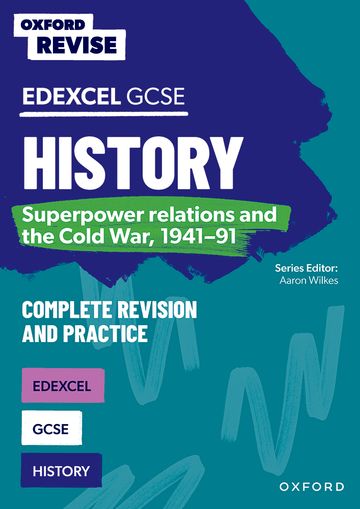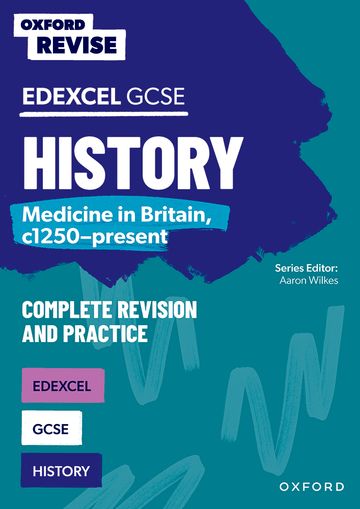Your GCSE History Exam Explained with Aaron Wilkes
Exam preparation can be challenging with multiple GCSE subjects to revise for. Aaron Wilkes our expert author for Oxford Revise explains about what you can expect from your History GCSE Exam .
Video Transcript
Hi, my name is Aaron Wilkes. I’m a history teacher, I train history teacher, and I also write student textbooks that you might use in your classrooms, including ones for Edexcel GCSE History. I also write things for the BBC too.
I’m going to talk to you a little bit about your Edexcel GCSE History exam. Things like how many papers there are, how long you get and also a little bit about how you might best revise.
OK so there are three papers for the exam. Paper one is your thematic study with your historic environment questions in that too. So it might be crime and punishment in Britain, with White Chapel as your historic environment or medicine in Britain with the British bit of the Western Front as your HE. It might be warfare with London in the Second World War as your HE, or you might be doing the new migrants in Britain thematic with Notting Hill as your historic environment.
You get an hour and 15 minutes on this paper. It’s a quick exam and you’ll get to see sources on this exam too. It could be images or diagrams, daily entries. But don’t dilly dally over the questions with this exam. If you’re asked to write 2 features of something and it’s worth 4 marks. Just write about two features. Take 5 minutes and move on. And an hour and 15 isn’t a lot.
Paper two is a longer one because it combines 2 topics. The British depth study, so perhaps Anglo-Saxon and Norman England. Or the really popular early Elizabethan England. And you have to do a period study too, so it might be the American West or superpower relations in the cold for example. You get more time on this paper with an hour and 45 minutes. So you should be spending about 50 ish minutes on each topic.
There’s lots of questions to cover, but none of the questions on paper 2 will get you to look at sources or interpretations. They’re straight questions and it’s vital that you know the sorts of things you need to be doing when you see certain questions, know what’s required of you when you’re asked to explain why, or write a narrative account. When you were asked how far do you agree? Have an opinion! Go for it and remember. Use your energy and your thinking and your knowledge to answer the question set, not the question you wished had been set.
Finally, paper three the modern depth study. So you might have studied Russia in the Soviet Union, or Weimar and Nazi Germany, or Mao’s China, or the USA at home and abroad between 1954 and 75, you get one hour 20 minutes with this.
We got to see all question types here. You get a straightforward explain why type question, but the majority of the questions in this paper focus on sources and interpretations they’ll be provided for you.
So to practice these question types. Know how to infer from a source, for example be able to say how useful sources are. And interpretations, work on being able to spot how interpretations might differ and how far you agree with the views expressed in one.
Look finally some tips how to revise? Firstly get a good revision guide such as the ones created by Oxford University Press and make time to revise. Get a timetable and try to stick to it. But at the same time make some time for you to still do some other things you enjoy.
Also get your head down. And how best you revise is probably something you’ve worked out by now, but for me. You know, I always advise making flash cards and creating mind maps for complicated topics. Find a study buddy to test you. Broaden your revision by listening to podcasts and watching revision clips. Work through exercises in a good revision guide and practice.
Don’t think a footballer who takes a free kick during the match hasn’t practiced all week. You don’t think that’s the first time that they have popped the ball down to shoot? They will have put the hard yards in beforehand. And so must you.
Finally top five takeaways.
Preparation is key to get a revision timetable, but don’t waste time doing ineffective revision techniques such as highlighting everything you know, make your work count, summarize things, transform them into something else which is a mind map or flash cards, and the third big tip apply what you are learning. So do practice exams. Final two know what to expect in each exam and answer the question set, not the question you wished been set.
Very best of luck.
Useful links
Revision books

Edexcel GCSE History Superpower Relations and the Cold War, 1941-91
Learn everything you need to know about the period topic Superpower relations and the Cold War, 1941-91. You will build the knowledge you need to do well in your Edexcel GCSE History exam.

Edexcel GCSE History Medicine in Britain, c1250-present
Learn everything you need to know about Medicine in Britain, c1250-present. You will cover all of the areas of this topic in order to to do well in your Edexcel GCSE History exam.